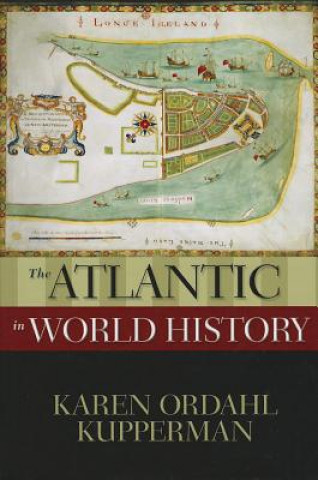
Kod: 04515910
Atlantic in World History
Autor Karen Ordahl Kupperman
As the Atlantic Ocean was transformed from a terrifying barrier into a highway uniting four continents, the lives of people all around the ocean were transformed. After 1492 merchants and political leaders around the Atlantic refo ... więcej
- Język:
 Angielski
Angielski - Oprawa: Twarda
- Liczba stron: 168
Wydawca: Oxford University Press Inc, 2012
- Więcej informacji o książce

Zobacz książki o podobnej tematyce
-

Protein Dimerization and Oligomerization in Biology
214.29 € -

Life of Sir Roderick I. Murchison
66.45 € -

Functional Thinking : A Protocol Study
66.04 € -

man of the world : a comedy
34.24 € -5 % -

Little Piece of Earth
17.88 € -

Romeo and Juliet: Shakespeare Can Be Fun
9.09 € -19 % -

Nelson the Noun
8.07 € -3 %
Podaruj tę książkę jeszcze dziś
- Zamów książkę i wybierz "Wyślij jako prezent".
- Natychmiast wyślemy Ci bon podarunkowy, który możesz przekazać adresatowi prezentu.
- Książka zostanie wysłana do adresata, a Ty o nic nie musisz się martwić.
Więcej informacji o Atlantic in World History
Za ten zakup dostaniesz 394 punkty
 Opis
Opis
As the Atlantic Ocean was transformed from a terrifying barrier into a highway uniting four continents, the lives of people all around the ocean were transformed. After 1492 merchants and political leaders around the Atlantic refocused their attention from trade highways in their interiors to the coasts. Those who emigrated, willingly or unwillingly, had their lives changed completely, but many others became involved in new trades and industries that necessitated consolidation of populations. American gold and silver contributed to the emergence of nation-states. New foods enriched diets all over the world. American foods such as fish, cassava, maize, tomatoes, beans, and cacao fed burgeoning populations. Sugar grown around the Atlantic transformed tastes everywhere. Tobacco was the first great consumer craze. Furs provided the raw material for fashionable broad hats. Chains of commodity exchange linked the Atlantic to the Pacific; they also linked Americans to the Mediterranean and the goods of the Middle East. Creation of Atlantic economies required organization of labor and trade on a scale previously unknown. Generations of Europeans who signed up for servitude for a number of years in order to pay their passage over were gradually supplanted by enslaved Africans, millions of whom were imported into slavery. Wars, fueled by the need for ever more slaves, spread throughout West and Central Africa. The African end of the slave trade produced powerful rulers and great confederations in Africa. Consolidation of displaced tribal groups and remnants of populations depleted by epidemic disease led to the emergence of the Six Nations of the Iroquois League in northern North America, and the Creeks, Cherokees, and others in the south. Those who made a choice to travel across the Atlantic did so for economic advancement, but many also were influenced by religious concerns. Conflict between Roman Catholics and Protestants in Europe, and the power of political leaders to force conformity, caused many to feel that their right to worship was under threat. They were willing to accept servitude to make emigration possible, in order to protect their religious lives. Attempting to create and control vast networks of settlement and trade enhanced the rise of nation-states in Europe and contributed to the growth of national identities. The wars of independence in the late eighteenth and nineteenth centuries changed the nature of relationships, but did not end them. Abolitionism serves as a vivid example of the collision of religious, philosophical, and economic realities and the ways in which the Atlantic context posed new possibilities and new answers.
 Szczegóły książki
Szczegóły książki
Kategoria Knihy po anglicky Humanities History Regional & national history
159.18 €
- Pełny tytuł: Atlantic in World History
- Autor: Karen Ordahl Kupperman
- Język:
 Angielski
Angielski - Oprawa: Twarda
- Liczba stron: 168
- EAN: 9780195160741
- ISBN: 0195160746
- ID: 04515910
- Wydawca: Oxford University Press Inc
- Waga: 362 g
- Wymiary: 236 × 162 × 14 mm
- Data wydania: 23. August 2012
Ulubione w innej kategorii
-

Hundred Years' War on Palestine
12.05 € -24 % -

Ethnic Cleansing of Palestine
14.41 € -23 % -

History of Japan
16.35 € -19 % -

Ten Myths About Israel
13.59 € -14 % -

Strange Death of Europe
16.55 € -23 % -

Decline and Fall of the Roman Empire
8.37 € -19 % -

Secret History
12.26 € -23 % -

God's Playground A History of Poland
68.70 € -

Mayflower
15.73 € -23 % -

How to be a Victorian
14.41 € -23 % -

Plantagenets
13.18 € -29 % -

General's Son
20.23 € -4 % -

Iran: A Very Short Introduction
8.99 € -31 % -

Temples of Karnak
153.46 € -

Cuneiform
11.13 € -23 % -

Twenty Years A-Growing
10.11 € -23 % -

History of Witchcraft in England from 1558 to 1718
19.01 € -

China in Africa
37.41 € -

Islandman
10.11 € -23 % -

Bohemian Paris
16.55 € -18 % -

Alexiad
17.78 € -20 % -

Lancaster And York
22.89 € -

Modern France: A Very Short Introduction
9.40 € -34 % -

Inside Hitler's Greece
20.95 € -20 % -

Diana: Her True Story - In Her Own Words
11.03 € -23 % -

The Fourth Turning
20.64 € -1 % -

The Oxford History of Ancient Egypt
15.53 € -23 % -

Churchill: The Power of Words
15.12 € -22 % -

Palestine
20.23 € -20 % -

Korean History in Maps
28.11 € -9 % -

Great Gatsby (Wisehouse Classics Edition)
16.14 € -37 % -

Viking Way
46.20 € -7 % -

The Thirteenth Tribe
12.57 € -

My Promised Land
20.85 € -23 % -

Vanished Kingdoms
18.80 € -22 % -

Age Of Revolution
16.55 € -23 % -

Life and Death of Anne Boleyn
22.99 € -

Coming of the Third Reich
18.70 € -23 % -

Children of Ash and Elm
16.96 € -22 % -

Europe Between the Oceans
34.24 € -6 % -

Socialism Betrayed
19.62 € -18 % -

303 Squadron
21.15 € -13 % -

Ancient Celts, Second Edition
26.88 € -18 % -

Dancing in the Glory of Monsters
15.73 € -23 % -

Battle of Britain: Luftwaffe Blitz (Images of War)
25.86 € -1 % -

Age of Confucian Rule
35.98 € -

Beyond Band of Brothers
16.55 € -23 % -

Benjamin Franklin
18.70 € -13 % -

On China
17.17 € -21 %
Osobný odber Bratislava a 2642 dalších
Copyright ©2008-24 najlacnejsie-knihy.sk Všetky práva vyhradenéSúkromieCookies



 21 miliónov titulov
21 miliónov titulov Vrátenie do mesiaca
Vrátenie do mesiaca 02/210 210 99 (8-15.30h)
02/210 210 99 (8-15.30h)